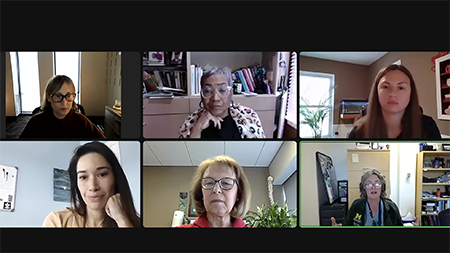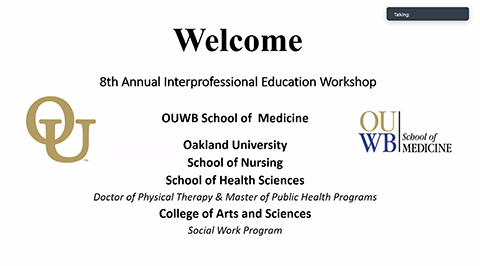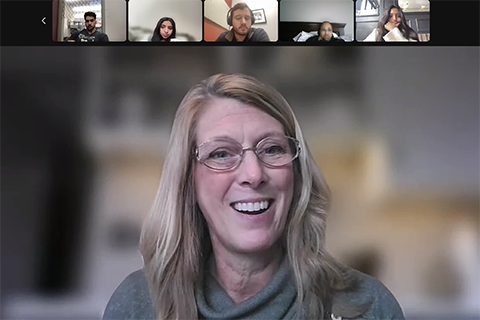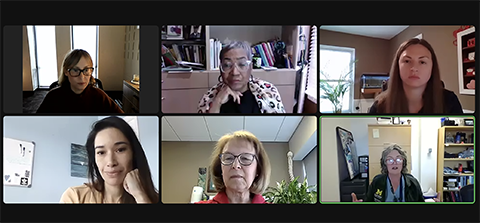OU’s Interprofessional Education Workshop highlights ‘Women and Substance Use Disorder’

Oakland University’s eighth annual Interprofessional Education Workshop put a spotlight on ways that health care professionals can work together to meet the specific needs of women affected by substance use disorder.
 |
The virtual event, “Women and Substance Use Disorder: A Patient-Centered Approach,” drew 320 students, faculty and community leaders from various health care disciplines, exploring how interprofessional collaboration can improve the health and quality of life of patients and their families.
Keynote speaker Anna Jessup, LMSW, CAADC, clinical analyst and women’s specialty services coordinator at Oakland Community Health Network, provided an overview of relevant topics, including: trends affecting women who use substances; impacts of substance use on the family unit; the role of care providers when treating women and families within the specialty population; and resources available to those struggling with substance use.
Jessup, an Oakland University graduate with over 10 years in the addiction field, noted that issues of confidentiality can often be a barrier to interprofessional collaboration and that, until recently, most research on substance use disorders has focused on white, cisgender men.
“Lots of research we saw did not apply to women, but we’re seeing that women are just as likely as men to develop a substance use disorder and are more vulnerable to cravings and relapse,” she said.
Sara Arena, professor and director of OU's physical therapy program, facilitates a small group discussion during the IPE Workshop. |
According to Jessup, one key to effectively treating women with substance use disorder is to understand their motivations for engaging in and seeking treatment for substance use. She pointed out that “relationships are one of the main motivators for women,” particularly those in the women specialty population, which includes women with children and those who are pregnant.
“Many women I treated over the years told me that the reason they started their substance use is because they wanted to please their partner,” Jessup shared. “The same reasoning applied to engaging in treatment and maintaining recovery. So when we’re looking at how to encourage women to engage or stay in treatment, we look at relationships, children and family dynamics.”
Jessup also reported that women tend to use substances to treat mental and physical health symptoms like chronic pain, anxiety, insomnia and eating disorders. Women are also more likely to have a history of trauma coexisting with a substance use disorder.
“We need to keep that in mind as we are working with someone and looking at the words we are using,” said Jessup. “How are we asking questions with assessments? Are we encouraging and keeping an open mind talking about substance use disorder and keeping our personal judgments and biases out of it?”
Following the keynote speech, students gathered in small interprofessional groups to discuss a case study of a 28-year-old woman dealing with pregnancy and opioid use.
Group members represented various health care professions, including nursing, physical therapy, medicine, public health and social work. Each group was led by a faculty facilitator who helped guide discussion on how members of an interprofessional team can collaborate to serve the needs of patients and their families.
Top from left, IPE Workshop panel moderator Maria Beam and panelists Vernice Anthony and Julayne MaGee. Bottom from left, panelists Toni Leaf-Odette, Melodie Kondratek and Vanessa K. Dalton. |
Later, the case study was discussed by a panel of health professionals who highlighted multi-disciplinary approaches to promote the health and well-being of patients and their families. The panel was moderated by Maria Beam, director of OU’s social work program, and featured five professionals with different care specialties and expertise.
- Vernice Anthony, BSN, MPH
- Vanessa K. Dalton, MD, MPH
- Melodie Kondratek, PT, DScPT, OMPT
- Toni Leaf-Odette, BSN, RN, RNC-NIC
- Julayne MaGee, LMSW, CAADC
Here’s what students had to say following this year’s Interprofessional Education Workshop:
“I believe that the value of interprofessional collaboration in health care is, first and foremost, to be able to best serve the client/patient. Each of the professions that were represented at this workshop are like single pieces of the healthcare puzzle. When we are all able to collaborate, the puzzle comes together, and the client/patient is able to feel safe, supported, and that the care they are receiving is being tailored to their unique needs.”
-Chelsea Campbell, Bachelor of Social Work, College of Arts and Sciences
“Just seeing health care from a different lens than I usually do opened my eyes to what others see and focus on. Everyone in the workshop had their own approach to caring for someone – none more important than the others. If we all get those varying perspectives, it will improve how we treat each other as colleagues, as well as our clients. This workshop made me even more hopeful for the future of health care. The better we know each other, the easier it becomes to provide well-rounded care.”
-Jared Barnett, Master of Public Health, School of Health Sciences
“I think the value of interprofessional collaboration in health care is that it improves overall patient health care outcomes and efficiency. It also allows medical professionals to get a clearer picture of the patient's overall condition.”
-Amber Cooper, Doctor of Physical Therapy, School of Health Sciences
“Creating safe spaces for patients is really important especially when there are so many health care providers a patient encounters in their lifetime. In order to ensure effective patient care we need to work together to create spaces where patients are comfortable to share their stories and experiences so that we can better address this when caring for them.”
-Jade Ayers, M2, Oakland University William Beaumont School of Medicine
After the workshop, participants had the opportunity to attend a virtual “Angel” training session, hosted by Families Against Narcotics (FAN). FAN's flagship program, Hope Not Handcuffs, allows anyone who is struggling with a substance use disorder to go to any of 125+ participating law enforcement agencies or community partners and ask for help. FAN then dispatches a volunteer “Angel” to meet the participant at their location, offer support, and work with the Hope Not Handcuffs call center to assist the individual with getting placed into treatment. The training also taught participants how to use naloxone (commonly known as Narcan), a medication used to reverse opioid overdoses.
This year’s workshop was organized by the Oakland University Interprofessional Education Task Force, which consists of faculty from the School of Health Sciences (Master of Public Health and Doctor of Physical Therapy programs), School of Nursing, Oakland University William Beaumont School of Medicine, and College of Arts and Sciences (Social Work Program). Funding and support for the workshop were provided by the School of Health Sciences and Oakland University William Beaumont School of Medicine.


 February 14, 2024
February 14, 2024
